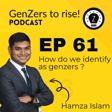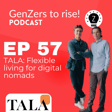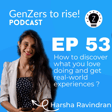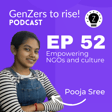Become a Creator today!Start creating today - Share your story with the world!
Start for free
00:00:00
00:00:01

Empowering Small Businesses with Nike Anani
Today we chat with Nike Anani, an accountant turned social entrepreneur. Nike runs a business that helps Nigerian family businesses grow through implementing business strategy. Her mission is to help family businesses last for generations. Listen to learn more about the process of working in a global setting.
Follow Nike Anani: https://lnkfi.re/nike-anani
Follow ChangemakerZ at https://go.changemakerz.org/follow
Episode's page https://podcast.changemakerz.org/nike-anani
Produced by Vasilis Skarleas
Transcript
Introduction and Overview of Changemakers
00:00:01
Speaker
Hello everyone, I'm Saloni. And I'm Vassilis. We run Changemakers, a student-run initiative that aims to empower, educate, and connect gem players interested in entrepreneurship. We interview teenagers with impactful projects and create resources to help you change the world. If they can't do it, so can you.
00:00:23
Speaker
On this podcast, we discuss logistics of creating different types of projects with Gen Zers who have already done it. We will leave our social media and website information in the description.
Meet Niki Anani
00:00:46
Speaker
Hello everyone, welcome to today's episode with another amazing guest. Today we have Niki Anani. Niki is an award-winning family business strategist, speaker and author. She has been featured in many TV shows and webinars. Here we are today to talk about social change and her journey starting multiple ventures.
Creating Multi-Generational Businesses
00:01:06
Speaker
Hello Anani. Hi Vasus, thank you so much for having me.
00:01:12
Speaker
We are so excited to have you on the show. So tell us a little bit more about your business. Great. So essentially I work with business owners to help them build businesses that would move from lifetime to what I term legacy. So businesses that would be multi-generational, businesses that would not only provide financial security to the owners, but also continue to have
00:01:41
Speaker
provides a role in ecosystem and wider value chain and making a positive impact on communities. It's great. So you work with the businesses and actually you dive deeper to what they need to improve and actually you help them with that part, right?
00:02:04
Speaker
Precisely, so from a legacy planning perspective, so very much long-term strategic planning, looking at succession planning.
Why Succession Planning Matters
00:02:14
Speaker
For instance, the business is set up by a founder, and the founder typically at the point when they realize, oh, they need the services when they want to pull back and retire and move on to other passions, and they don't have anyone to pass on the responsibility to.
00:02:30
Speaker
So I work with that succession planning to know what's next after the founder. And also what's the compelling vision, compelling purpose, compelling mission that would galvanize other fans, other stakeholders to take an interest in the business, for instance, their children or non-family staff to be interested in how can we
00:02:59
Speaker
protect the future of the business and create the business of the future. Well, that's a great quote. So you initially started in consulting. What initially drew you to that as a career path?
From Corporate Tax to Entrepreneurship
00:03:13
Speaker
Yes, I started my career straight after university in Deloitte in Corporate Tax International. And what drew me to that sphere was the opportunity to learn. Really, I loved Deloitte. It was a great training ground to learn in terms of structured learning and also informally. And it was a great opportunity to be the best version of myself
00:03:42
Speaker
It was a great opportunity to learn what institutional organizations, how they're able to build legacy organizations that are not dependent on any given individual.
00:03:55
Speaker
And that was really what drew me to that, an opportunity to learn about a wide variety of industries, to work with a variety of projects. That was really important to me to have breadth and not just depth. That was what drew me to consulting at the early start of my career. And when did you make the jump from consulting to entrepreneurship? Did you find yourself applying your consulting knowledge to help run your business?
00:04:25
Speaker
Indeed. I mean, I moved from consulting to entrepreneurship 10 years ago. So three years into my career as an accountant, a tax specialist, I decided that I wanted something less regimentry and I wanted to get out into the world and
00:04:45
Speaker
be closer to where the action was. But like you kind of alluded to, I did find myself applying the knowledge, the thinking, the values that had been imbibed to me in my Deloitte days in my family business.
Applying Consulting Skills in Lagos
00:05:01
Speaker
So I ended up
00:05:02
Speaker
Moving from London to Lagos, Nigeria, working with my father in our family businesses, and I was able to put together a lot more structure, so in terms of human resources, in terms of strategy, administration, finance, culture, and these were all things that I'd learnt from being at Deloitte, whether explicitly through
00:05:28
Speaker
are the department in which I worked in or implicitly through what was imbibed in me through my time there. And also as an accountant, I trained up as a chartered accountant during my time at Deloitte. So I'd learned a lot on business management, business operations, business culture. So you cover many, many different things simultaneously. That's great. From my understanding, both of your current businesses provide services in Nigeria.
00:05:56
Speaker
What is like working in an international setting? Yeah, I mean, the word international is a very broad word, isn't it? And it depends on where you're talking about. So I can only speak from the perspective of me having exposure to Nigeria and Africa specifically. I mean, I'm now based in Austin, Texas. So I relocated to Austin three months ago. So I'm learning again, yet another new environment.
00:06:26
Speaker
Working in Lagos in Nigeria is different business culture. In the city of London, I found it really exciting. There was a lot more opportunity.
00:06:39
Speaker
Unfortunately, a lot of deficits in African context, but those deficits are really just can be reframed as opportunity. Opportunity in a range of sectors, in practically every sector, there's an opportunity to provide an unfulfilled need to innovate
00:06:57
Speaker
to make things better for customers locally and wider ecosystems and communities. And so that was really what pulled me back to Lagos in Nigeria.
Bridging Generational Gaps
00:07:13
Speaker
And I loved working in Lagos, Nigeria. I was there for 10 years. Yeah. I think that sometimes it's great to keep part of your
00:07:25
Speaker
you know, racings like to keep them close so that you can feel like being home even you are very far away. It's really interesting how your aim is to bridge the gap between younger and older generations which help people create lasting businesses. What are some quick tips that you have for established businesses that they feel a bit crowded out due to the influx of so many new startups and businesses?
00:07:54
Speaker
That's an interesting question. I think for established businesses that are now facing competition so to speak by new businesses, you can leverage off your advantages. So you have an established name,
00:08:09
Speaker
you have established customers established stakeholders you can use that to your advantage the second is i wouldn't rush to recreate everything that your competitors are doing however i would pause to have.
00:08:26
Speaker
dialogue and conversation with your customers and potential target customers to see whether there's an opportunity to serve them in a way that is more preferable to them, to look through their preferences, their perspectives, their priorities.
00:08:42
Speaker
platforms, paradigms, to see if there's an opportunity to do things in a better way because the world is very disruptive right now and it will continue to be even more disruptive. It's really important as business owners that we're constantly adapting, we're constantly transforming, we have our fingers on the pulse of the consumer. Ultimately the consumer is
Adapting Established Businesses
00:09:08
Speaker
king, so that's what would be my advice.
00:09:12
Speaker
Leverage off your strengths, which you have an advantage in terms of established name, track record. Don't necessarily seek to repeat or recreate what you're seeing. However, do pause and seek to lean into your customers and listen to them with an open mind to seek to serve them in a better way.
00:09:36
Speaker
That's extremely important, like to adopt all the new things that maybe customers want to change according to the current trends, if we could say that, but also to continue to select data that are
00:09:55
Speaker
You know, very specific to what they represented, not to be crowded with like many, many submissions that like on the internet today, you can find many, many things, but you can't trust everything. You can't filter everything. It's impossible. So the business and the business owners from 30 teams, it's important to keep filtered all the data that they select for their products. I'm really interested in learning more about the concept of a family business.
00:10:25
Speaker
What does it mean exactly? A family business is just a business where the beneficiaries are individuals as opposed to institutional and or the management of the business you have two or more family members working together in the business.
00:10:45
Speaker
Quite often, entrepreneurs are family businesses, so if an individual sets up a venture and it's owned 100% by himself or herself, that is a family business to be going formally and strictly speaking. Or, for instance, if two partners come together and decide to set up a venture, that also is, and they might not be related, that is a family business because
00:11:13
Speaker
More than 30% of the shares are owned by an individual as opposed to an institutional.
00:11:27
Speaker
Yes, so institutional owners. The distinction is that individuals and families see things differently, typically, than your more established non-family firms. They tend to be more nimble. They tend to make quicker decisions. They tend to be more long-term oriented. They tend to integrate a wider range of stakeholders into their thinking.
00:11:53
Speaker
And also they tend to think about the purpose of the business is for their family, to provide financial security for their family. And this confluence of family and business gives rise to some great areas that can create some challenges. For instance, how do you deal with employing family members?
00:12:16
Speaker
Are you employing based on merit? Are you employing based on the fact that they have a certain surname? Or how do you deal with entry criteria for people to be on the board? Is that if you have a certain surname or is that merited? And or how do you deal with when you're thinking about a generational transition, who should succeed?
00:12:39
Speaker
as the leader of the business. Is that based on being the eldest son? Is that based on other criteria? So these are the kind of issues that arise when you have a family business. I see. Well, we have been informed that you have a nonprofit community of African business owners, helping them with building generational wealth.
00:13:05
Speaker
to reserve generational poverty in the African community. What actions are you taking at African family firms to make that happen?
Supporting Generational Wealth in Africa
00:13:14
Speaker
Yes, we're very passionate about creating generational wealth and generational legacies on the African continent. And we do that through four main activities in our community. Firstly, facilitating connection within different members across industry, across geography, essentially creating a safe space for families.
00:13:37
Speaker
where they can share their issues and seek solutions with one another, connect with one another, learn from one another. The second is through education, through formal education, so training, webinars, conferences, summits and things of the like, to provide business owners with that awareness of the issues that they may be facing.
00:14:00
Speaker
because the conversation on family business and legacy businesses is relatively new in Africa. There's a huge need to provide a lot of education and awareness and so we do that through conferences and trainings and things like that like I mentioned. The third is through research so unfortunately the conversation is relatively nascent on the continent and so we don't really have much data who are
00:14:26
Speaker
the family businesses, which industries are they in? What are the issues that are plaguing them? We do have one piece of data that's really pertinent, and that is that only 2% of business owners in Nigeria specifically would outlive, the businesses would outlive the founder, which means 98% of family businesses in Africa, or sorry, in Nigeria, would die when the founders die, compared to 33%
00:14:56
Speaker
sorry, compared to 66% that would die in the rest of the world when the founders die. So we are significantly above the global average. And so we're seeking to do more research on why are we seeing this 98%? What can we then do? How can we design our programs to better serve our audience? And lastly, we do this through advocacy. So pushing for
00:15:23
Speaker
regulation for policies that will ensure that family businesses thrive during their lifetimes as well as over a legacy period. Because family businesses are important not only for families, not only for the employees which they employ and provide much needed jobs on a continent that unfortunately faces significant poverty, both absolute and relative poverty. But also they play a huge role in ecosystems.
00:15:51
Speaker
They are at the helm of communities, they hold up communities, the communities which they serve in their businesses and also the communities of origin where the individual families come from, they typically would support their villages and so on and so forth. So it's really critical that we continue to champion for policy change that would ensure the sustenance and thriving of our family businesses in Africa.
00:16:21
Speaker
Yeah, so they are part of the community and that's an important reason why they should be maintained and through the conversation that could be improved by all the measures that you explained to us so briefly.
00:16:35
Speaker
I think that this could be possible and we hope that with these actions and other actions like the SDGs in education could also provide other perspectives to the youth to understand the importance of these things and find new and other ways to make this possible. Right now you are writing a book which is so amazing. So what
Writing 'Lifetime's Legacy'
00:17:01
Speaker
is it about? What has the process been like?
00:17:06
Speaker
Putting Finish in Touch is to a book called Lifetime's Legacy, a new vision for multi-generational family enterprises. It's been an arduous journey, to be perfectly honest with you. To sit still and to commit to writing a book is not an easy process, but it's been also incredibly... It's just been amazing to...
00:17:31
Speaker
to reflect on all that I've been through both as an individual second generation business owner as well as an advisor and a non-profit founder having seen so many families and the key themes that I've seen and the reasons why we haven't seen as much multi-generational success in Africa particularly and the things that families can seek to do the steps they can seek to take to empower them on a journey of legacy that's really what it's
00:18:01
Speaker
It's about, so I'm really excited. It'll be coming out in January, late January. Yeah. We can't wait to see like the final result. Like it's what you said that in a book you reflect all your thoughts, you reexamining everything that you have seen. And in the end you want it as a legacy of you and what you preserve.
00:18:25
Speaker
Like, it's what we did in the change-making set, but in a different way, like, we want to preserve everything that we have done, starting from the old class, going to the articles, and all the other news. But in the end, maybe if something happens and we can't handle it anymore, for sure we are, like, searching a way to maintain everything alive on the Internet, so people can find one way, one day, and think about that.
Building with the End in Mind
00:18:54
Speaker
What advice do you have for any aspiring entrepreneurs? Oh, I always say build with the end in mind. And so I have a construction background and when we are
00:19:09
Speaker
Before we embark on any construction, we have a design, we have architectural drawings, engineering studies, and we spend a lot of time on our foundation, particularly if we're building a really tall building.
00:19:24
Speaker
We actually spend more time on the foundation before we start the building, building upwards. And so if you are building for legacy, it's absolutely critical that you spend time in the foundations of your business to ensure that you have the human resources, right? The financial
00:19:43
Speaker
discipline and rigor, right? Yes. Strategic formulation, right. Innovation, right. Succession planning, right. Corporate governance and family governance, right. So those are the key elements to ensure that you're actually going to build a legacy business.
00:20:01
Speaker
Another thing is I often say that it's important to leave a legacy, but it's also important to live a legacy. So in your lifetime, how are you making an impact, so to speak?
00:20:16
Speaker
And this concept of legacy takes into consideration over time, which we traditionally think of when someone passes away, we talk about they left such an amazing legacy, but also over space. So beyond yourself, who are you touching? Is it in your
00:20:39
Speaker
Value chain, are you empowering folks in your value chain to ensure that you're being more environmentally friendly, you're amplifying the voices of those that have been marginalised, you're empowering them financially.
00:20:56
Speaker
and things of the like. So it's really important to not only leave a legacy, but also to live a legacy.
Emotional Ownership in Family Businesses
00:21:04
Speaker
And lastly, for those that have children and spouses, your children and spouses can't love what they don't know. And that's your business, right? Often business owners that I've come across, later down in their entrepreneurship journey,
00:21:22
Speaker
They only start to think about passing on the helm of responsibility to someone else when they want to retire. But by that point, it's too late because nobody else in the family cares about the business, right? They've all moved on. They all have their own ambitions and dreams and passions. And it's not enough to be
00:21:41
Speaker
a legal owner of a business, that doesn't inspire passion, right? I always say matters of the heart can't be legislated. You can't mandate them through legislation, but only through inspiration. So just because your kids will be 33% owners of your business doesn't mean they will care and give it their all. But instead, what we want to achieve is emotional ownership.
00:22:07
Speaker
And inspiring that emotional ownership for this true commitment, true passion, true ownership, so to speak, starts from much younger. It starts from them being exposed to business, them knowing the business, them forming their opinions of it, because it's impossible to fall in love with something that you don't know. And so those are the three areas that I would really impress upon business owners. Start with the end of mind.
00:22:38
Speaker
live a legacy not just leave a legacy and seek to promote emotional ownership with your family members. I'm so happy that you mentioned like for those that do have children because it's the first time that we collaborate and generally I think that this is a huge conversation that we should cover on other groups like it's only for what you said like for the children to like if they will be passionate about what their
00:23:08
Speaker
father or mother is doing but also to which are the path that the children want to follow when it's time to select and yeah i think that in today's world like in many societies like men children feel the pressure to follow the road that they don't want or it becomes the opposite sometimes so yeah i think that's a huge part
00:23:37
Speaker
And also I like that you mentioned about live like as well as live a legacy like. I think that this is the ideal power of humans to continue innovate beyond the suns and that's extremely important. So yeah. So another great episode came to its end. Thank you so much Niki for being with us today. Thank you so much for having me. Thank you.
00:24:03
Speaker
Guys, we will be featured at Nicky's podcast probably sometimes in the future so please keep an eye open to our Instagram and until next time, don't forget to change
00:24:22
Speaker
We hope you guys enjoyed our conversation. We had such a great time. Make sure you leave us a review. You can also follow us on Instagram at changemaker.c to keep up with all of our new content. We also have a Facebook page called changemakersc, but you'll need to look down because I honestly don't even know how Facebook works.



















